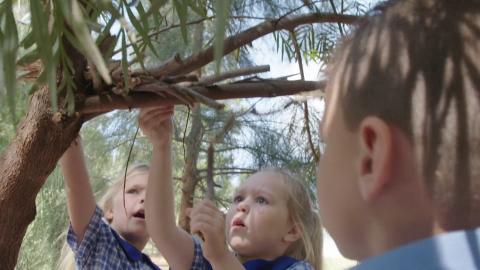Strong speaking and listening skills provide children with a platform to communicate effectively and predict children’s success in formal classroom settings and life.

Download the Speaking and Listening printable resource
Curriculum
Early Years Learning Framework (ELYF)
- Children are connected with and contribute to their world
- Children are confident and involved learners
- Children are effective communicators
Families
Read (2 mins)

Oral language and early learning experiences provide the underlying foundation for all literacy.
Regularly talking and interacting with your child extends their speaking and listening skills and helps grow their confidence. These skills help children to respond to the world around them and enriches their understanding.
Talking to your children builds vocabulary and new learning.
When children are learning to speak they are learning to express themselves in words that convey meaning through tone, volume, pauses and inflection.
When children learn to listen they are learning to understand language expressed by others.
Explore (10 mins)

Some ideas for learning in the everyday:
- Include your child when discussing everyday activities such as grocery shopping, gardening, cooking dinner, collecting mail from the mailbox, doing housework, and travelling in the car or bus.
- Look at picture books or art books. Ask your child to describe what is happening in the pictures and make up stories together.
- Share and talk about family histories and family photos.
- Play vocabulary games with your child such as, “What’s the opposite of ….?” (for example, “What’s the opposite of big?”) and “What’s another word for….?” (for example, “What’s another word for angry?”).
- Look at ‘junk mail’ and talk about the things for sale.
Teachers
Reflect (30 mins)

Reflect on your knowledge and practice. Consider the EYLF, NSW Syllabus and LPs:
- Where have these children come from?
- Where are you taking them?
Think about the learning that happens in your classroom that builds the knowledge and skills for speaking and listening.
What do you expect from the early learner?
What do you want parents to know about speaking and listening?
How is speaking and listening used across the curriculum?
Consider this skill – What are the connections between literacy and numeracy?
This is an opportunity to share what speaking and listening looks like in your classroom.
Engage (45 mins)

Engage in a learning conversation with parents. Suggested conversation starters:
- Is there anything in the video that challenged your thinking about learning?
- What foundational speaking and listening skills did you see in the video?
- How are the children:
- Practising their skills?
- Testing their ideas?
- Building their knowledge?
- What opportunity can you create or do you have at home that develops speaking and listening?